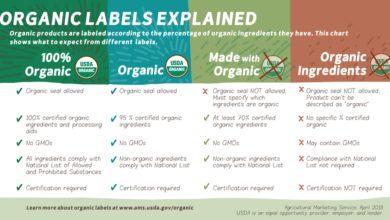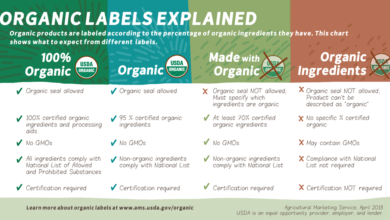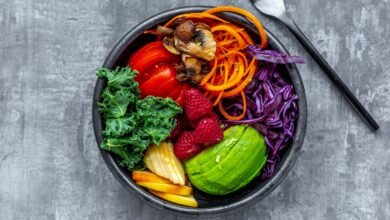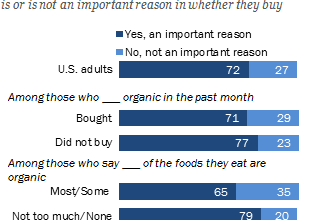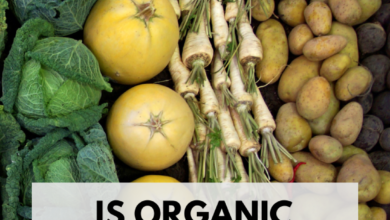
How Does Organic Food Affect Your Health
Organic food can improve your health. It often contains fewer chemicals and additives.
Organic farming practices emphasize natural growth and sustainability, which can lead to healthier produce. Eating organic means choosing foods grown without synthetic pesticides or fertilizers. This choice might help reduce exposure to harmful substances. Many people believe organic food is better for the body and the planet.
The nutrients in organic produce can be more potent, supporting better overall health. Switching to organic can be a simple yet impactful step toward wellness. This blog explores how organic food can influence your health. Discover the benefits and understand why more people prefer organic options for their diet. Dive in to learn how organic choices might enhance your lifestyle.

Credit: www.facebook.com
Organic Vs Conventional
Choosing between organic and conventional food can be confusing. You might wonder which is healthier for you. Let’s break it down and see how these two types of food differ.
Nutrient Differences
Organic foods often boast higher nutrient levels. Studies have shown that organic fruits and vegetables can contain more antioxidants. These antioxidants help your body fight off harmful molecules.
Organic dairy and meat products may offer higher omega-3 fatty acids. This is due to the animals having better diets and living conditions. Omega-3s support heart health, making them essential for your diet.
However, nutrient differences can vary based on farming practices. Not all organic foods are guaranteed to have higher nutrients. So, it’s worth checking labels and knowing where your food comes from.
Pesticide Residues
One of the main reasons people choose organic is to avoid pesticides. Organic farming restricts synthetic pesticides, reducing residues in your food. This can be a relief if you’re concerned about chemical exposure.
Conventional produce often uses chemical pesticides to boost yield. You might ingest small amounts of these residues. Washing and peeling can reduce this, but some pesticides penetrate deeper.
Reflect on your daily food choices. Do you prioritize avoiding chemicals? Organic might be the way to go if pesticide residue worries you.
Consider your health goals and preferences. Would you choose nutrient-rich foods over convenience? Organic might offer the benefits you seek. Your decision can impact your health and well-being, so choose wisely.
Nutritional Benefits
Organic food offers several health benefits, including higher levels of antioxidants and fewer pesticides. These foods can support a healthier immune system and better overall well-being. Eating organic may also reduce the risk of certain diseases, contributing to a balanced and nutritious diet.
Choosing organic food can have a significant impact on your health, especially when it comes to nutritional benefits. While some people may question the difference between organic and conventional foods, the nutritional content is a key area where organic foods often stand out. Let’s dive into some of these benefits and see how they can influence your well-being.Vitamins And Minerals
Organic fruits and vegetables are often richer in essential vitamins and minerals compared to their conventional counterparts. Growing methods that avoid synthetic pesticides and fertilizers can lead to higher nutrient density. Imagine biting into an organic apple; not only are you enjoying a fresh taste, but you’re also fueling your body with more vitamin C and calcium. Have you noticed how vibrant organic produce looks? This isn’t just for show. The richness in color often reflects higher levels of vitamins and minerals. Adding these nutrient-packed foods to your diet can help support your immune system and overall health.Antioxidant Levels
Organic foods generally contain higher levels of antioxidants. These powerful compounds help protect your body from oxidative stress and free radicals. Eating organic berries, for example, can give you a boost of these beneficial antioxidants like anthocyanins and polyphenols. You might wonder, why is this important? Antioxidants play a crucial role in reducing inflammation and lowering the risk of chronic diseases. Next time you’re shopping, consider picking up organic options to give your body that extra defense it needs. It’s fascinating to see how small changes in your diet can lead to big improvements in health. Have you ever felt a difference in energy or mood after eating organic? The increased nutritional benefits might just be the reason. By choosing organic, you’re not only investing in your health but also making a statement about the quality of food you want for yourself and your family.Health Impact
Organic food offers various health benefits. Many people choose organic for fewer chemicals. This can lead to a healthier lifestyle and better well-being. Understanding the health impacts of organic food can help you make informed choices. Let’s explore how organic food can improve your health.
Immune System Boost
Organic food can strengthen your immune system. It contains higher levels of essential nutrients. Vitamins and minerals in organic produce are more abundant. These nutrients support the body’s defense mechanisms. They help fight off infections and diseases.
Organic foods are free from harmful pesticides. Pesticides can weaken your immune response. Eating organic reduces this risk. It can enhance your body’s natural defenses. A strong immune system means fewer illnesses.
Chronic Disease Prevention
Consuming organic food may lower the risk of chronic diseases. Organic produce is rich in antioxidants. Antioxidants protect cells from damage. This can reduce the risk of heart disease and cancer.
Organic food also has fewer artificial additives. These additives can contribute to health issues. Choosing organic can help maintain a healthy weight. It supports overall wellness and longevity.
Organic meat and dairy come from animals fed natural diets. This results in healthier fats and nutrients. It can reduce the risk of cardiovascular problems. Embrace organic to support long-term health.
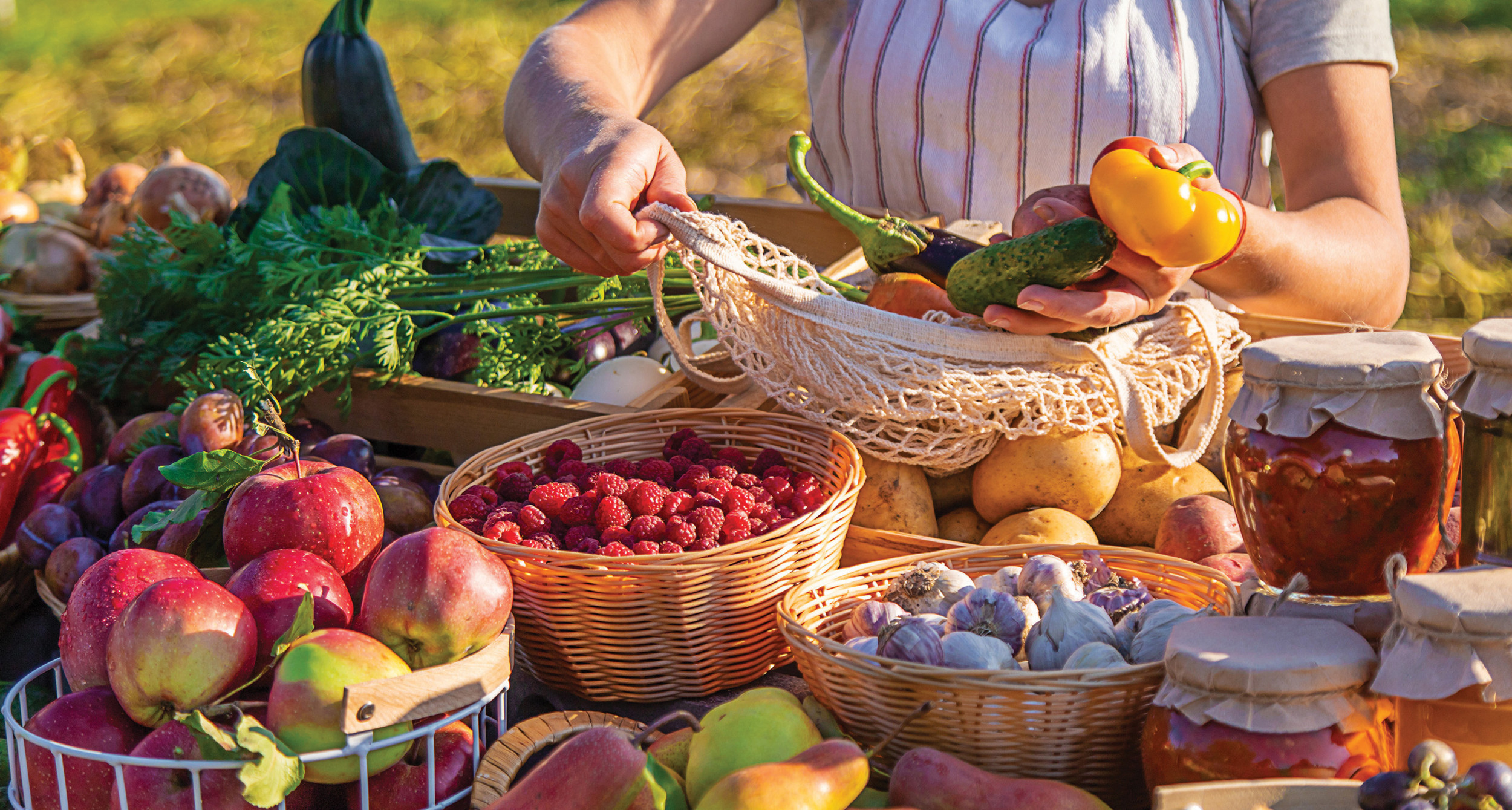
Credit: www.legion.org
Pesticide Exposure
Organic food is often praised for its health benefits, particularly because it typically contains fewer synthetic pesticides. Pesticide exposure is a significant concern, and understanding its implications can guide you towards healthier choices. Whether you’re considering an organic lifestyle or already living one, knowing how pesticides affect your health is crucial.
Health Risks
Pesticides are designed to kill pests, but their impact doesn’t stop there. They can also pose health risks to humans. Studies link pesticide exposure to various health issues like hormonal disruptions, cancer, and neurological disorders. Even small amounts can accumulate over time, potentially leading to long-term health problems.
Consider how your daily choices affect your health. Eating foods with high pesticide levels might seem harmless, but cumulative exposure can be risky. Think about your loved ones, especially children, who are more vulnerable to these chemicals. How would you feel if your food choices inadvertently put them at risk?
Reducing Exposure
Switching to organic food can significantly reduce pesticide exposure. Organic farming practices avoid synthetic pesticides, offering a cleaner food option. Start with fruits and vegetables known for high pesticide residue, like strawberries and spinach.
Imagine your next grocery trip. Instead of grabbing the usual produce, consider choosing organic versions. Not only are they often fresher, but they also reduce your exposure to harmful chemicals. Isn’t it worth spending a little extra for peace of mind?
Growing your own produce can also be a rewarding way to limit exposure. Even a small garden can provide fresh, organic options. Imagine picking tomatoes from your backyard, knowing they’re free of synthetic chemicals. What better way to ensure your food is truly safe?
Environmental Influence
Choosing organic food impacts your health and the environment. When you opt for organic, you’re not just making a personal health choice; you’re also supporting practices that can benefit our planet. Let’s dive into how organic food influences the environment through soil health and biodiversity.
Soil Health
Organic farming enhances soil health. These practices avoid synthetic fertilizers and pesticides. Instead, they use natural methods like composting and crop rotation.
Imagine visiting a farm that uses organic methods. You might notice rich, dark soil teeming with earthworms. Healthier soil means better crops, which can lead to healthier food for you.
Think about this: How does the food you eat relate to the soil it comes from? Healthier soil can lead to more nutrient-rich produce on your plate.
Biodiversity
Organic farming supports biodiversity. By avoiding harmful chemicals, farms encourage a variety of plants and animals to thrive.
Picture walking through an organic farm. You might see butterflies fluttering around diverse plant species. Such diversity can lead to a more resilient ecosystem.
Consider this: Have you ever thought about how the diversity of life on a farm affects the food you eat? A richer ecosystem can provide a more balanced diet for you.
When you choose organic, you’re contributing to a healthier planet. And a healthier planet can lead to healthier food choices for you and your family.
Consumer Perceptions
Organic food can boost health by reducing exposure to harmful pesticides and chemicals. Consumers often perceive it as more nutritious due to its natural cultivation methods. Eating organic may also lead to better overall well-being, contributing positively to a healthier lifestyle.
When people think about organic food, their perceptions vary widely. Some see it as a pathway to better health, while others wonder if it’s worth the extra cost. As someone who once stood in the grocery aisle debating between organic and conventional apples, I understand the mixed feelings. How do you perceive organic food, and what factors influence your choices?Taste Preferences
Many consumers believe organic food tastes better. You might find the flavors richer and more authentic. A friend once shared how an organic tomato reminded her of her grandmother’s garden, evoking a sense of nostalgia and delight. Taste can be subjective, but the idea of eating food that’s closer to nature can be appealing. Have you ever noticed a difference in taste between organic and non-organic foods? This perception can often guide your purchasing decisions.Health Consciousness
For health-conscious individuals, organic food represents a cleaner, safer option. The absence of synthetic pesticides and fertilizers is a significant factor. You might feel more at ease knowing you’re reducing your exposure to potentially harmful chemicals. Choosing organic can also be about the bigger picture. Are you motivated by the desire to support sustainable farming practices? Understanding these motivations can help you align your choices with your health goals. Navigating the world of organic food involves balancing taste, health benefits, and personal values. How does your perception of organic food shape your eating habits? Your answers might reveal more about your priorities than you realize.Cost And Accessibility
Organic food can be more expensive and harder to find than non-organic options. High costs and limited availability might make it difficult for everyone to access organic produce. Balancing budget and health needs is important when considering organic food choices.
Choosing organic food can be a rewarding decision for your health, but it often comes with concerns about cost and accessibility. Understanding these factors can help you make informed choices about your diet. Let’s explore how organic food prices compare to conventional options and the challenges you might face in accessing these healthier choices.Price Comparison
Organic food typically costs more than conventional food. You might find the price difference at your local grocery store to be quite noticeable. This is because organic farming avoids synthetic pesticides and fertilizers, often resulting in higher production costs. Consider a simple comparison: the cost of a gallon of organic milk is usually higher than that of regular milk. This price gap can vary depending on where you live. However, many people believe the health benefits and environmental impact of organic foods justify the extra expense. Are you willing to invest more in your health by choosing organic, or do these prices put a strain on your budget?Availability Challenges
Accessing organic food can be challenging, especially if you live in a rural area. Not all grocery stores carry a wide range of organic options. This limits your ability to integrate organic choices into your diet consistently. If you’ve ever driven miles out of your way just to find organic produce, you know this struggle. Farmers’ markets can be a great alternative, offering local organic produce. However, they are not always available year-round or accessible to everyone. Consider growing your own organic vegetables as a solution. Even a small garden can provide you with fresh, organic produce, reducing your reliance on store-bought items. Have you explored local co-ops or community-supported agriculture (CSA) programs? These can be excellent sources of organic food and help support local farmers. Navigating the world of organic food might seem daunting, but understanding the cost and accessibility can help you make better choices for your health.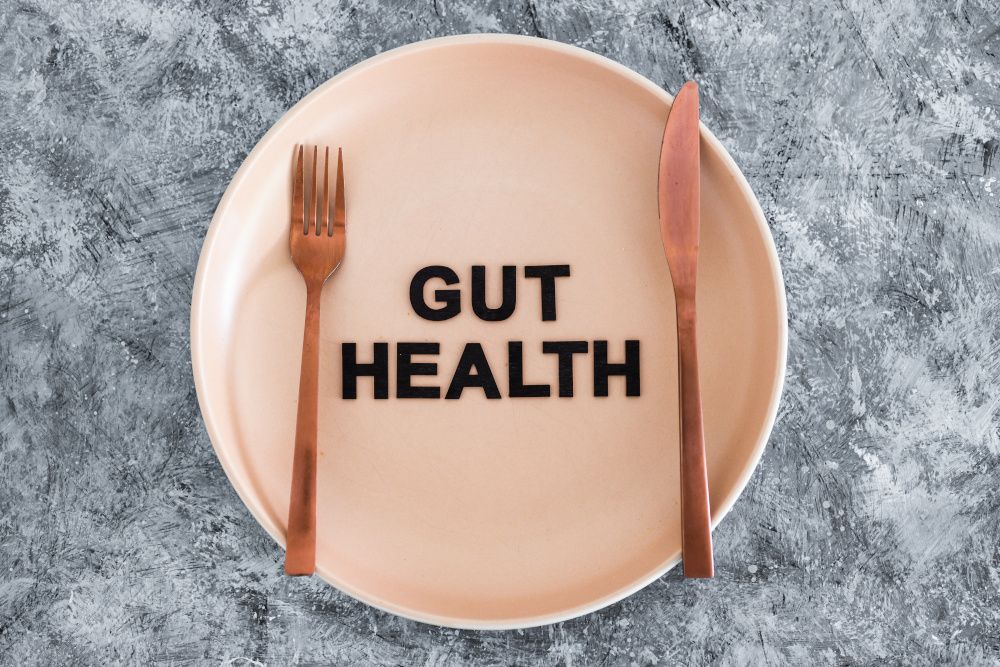
Credit: www.belandorganicfoods.com
Future Of Organic Food
The future of organic food seems promising and transformative. As awareness grows, more people turn to organic options. This shift impacts health, environment, and the economy. So, what does the future hold for organic food? Let’s dive into some key areas shaping the future of organic food.
Market Trends
Organic food sales continue to rise globally. Consumers seek healthier choices. They prefer food free from pesticides and chemicals. Big companies notice this trend. They invest in organic lines. Small farms grow their reach through local markets. This helps meet growing demand. Online platforms also play a key role. They make organic food more accessible. More choices for consumers mean better health options.
Sustainability Efforts
Organic farming supports sustainability. It avoids harmful chemicals. This protects soil and water. Farmers use natural methods for pest control. They rotate crops to maintain soil health. These practices reduce pollution and promote biodiversity. Sustainable methods also support animal welfare. Animals live in better conditions. This results in healthier food products. Governments and organizations support these efforts. They provide incentives and resources for organic farmers. These efforts ensure a sustainable future for organic food.
Frequently Asked Questions
How Does Organic Food Affect Our Health?
Organic food often contains fewer pesticides and chemicals, which may reduce health risks. It is richer in certain nutrients like antioxidants. Consuming organic food might lower the chance of allergies and may support heart health. Always wash produce to remove any residues.
What Happens To Your Body If You Only Eat Organic Food?
Eating organic food may reduce exposure to pesticides and GMOs. It can improve heart health and enhance antioxidant intake. Organic diets might support better weight management and promote environmental sustainability. Transitioning to organic foods could also lead to fewer artificial additives in your meals, potentially benefiting overall health.
What Are The Disadvantages Of Organic Foods?
Organic foods can be more expensive than conventional options. Availability is often limited, affecting variety. Organic farming may yield less produce due to stricter practices. Some organic products might spoil faster without preservatives. Certifications can be misleading, causing confusion.
Are Organic Foods 100% Free Of Pesticides?
Organic foods aren’t 100% free of pesticides. They can contain natural pesticides approved for organic farming. These are typically less harmful than synthetic ones. Organic farming uses strict guidelines to minimize pesticide use, ensuring safer produce. Always wash organic foods thoroughly to reduce any pesticide residue.
Conclusion
Organic food can boost your health in several ways. It often contains fewer chemicals. More nutrients too. This means better health and stronger immunity. Eating organic might also reduce allergy risks. Your digestion may improve as well. Organic farming respects the environment.
This can lead to healthier communities. Choosing organic supports sustainable practices. This benefits both your health and the planet. Small changes in diet can make a big difference. Consider adding organic foods to your meals. Feel the positive impact on your health.
Remember, a healthier choice today means a better tomorrow.



